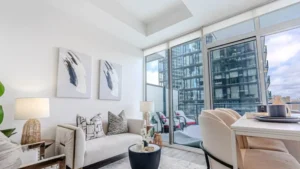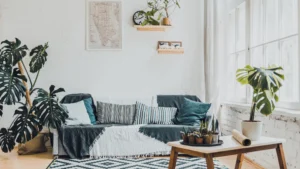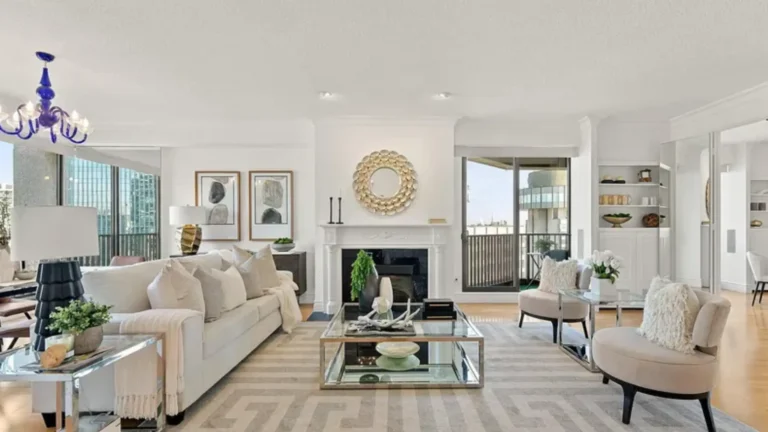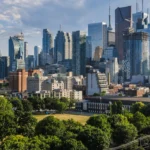The short-term rental market is thriving, making Airbnb investments in Toronto an attractive opportunity for property buyers and hosts. With the city’s booming tourism, major events, and diverse neighborhoods, a well-located Airbnb can generate higher returns than traditional rentals—but success requires smart planning.
This guide covers:
✔ What to consider when buying an Airbnb property
✔ Best (and most surprising) neighborhoods for short-term rentals
✔ Budgeting & profit-maximizing strategies
✔ Airbnb vs. long-term rentals: Pros & cons
✔ Toronto’s 2024 Airbnb regulations (with official rules)
Let’s dive in!
Buying a Property for Airbnb in Toronto: Key Considerations

If you’re thinking about buying a property to list on Airbnb in Toronto, the first thing to keep in mind in 2025 is that regulations are strict and the city demands that you use your principal residence (where you live and the address you use for bills, identification, taxes and insurance).
If this condition works well for you, then location should be your top priority, as it usually is for tourists. They flock to neighborhoods like the Downtown Core, Harbourfront, and the Entertainment District, though these neighborhoods come with premium price tags. For better affordability without sacrificing demand, consider up-and-coming areas like Leslieville or West Queen West, where trendy cafes and a great local vibe are drawing more visitors each year. Do your research on zoning restrictions as well.
Proximity to transit is also essential to boost bookings, as tourists prefer easy access to main attractions. So a close eye on bus routes, subway or streetcar stations can help you land the best location for your Toronto Airbnb investment.
Obviously, the type of property you choose also plays a big role in the type of guests you attract. Condos, especially one- or two-bedroom units, are ideal for solo travelers and couples, while entire homes (like townhouses or detached properties) cater well to families and groups. Whatever you pick, make sure it has the essentials your type of guests expect: reliable WiFi, a smooth self-check-in process, a fully equipped kitchen, and strong heating or air conditioning for Toronto’s unpredictable weather are top of the list for most users. Family homes also benefit from games or BBQ equipment, while younger audiences in condos might look for smart TVs, great sound systems, and other smart devices.
Before committing, do your homework. Check out competitor listings in your desired area and explore the areas in Airbnb to see pricing information. This research will help you spot the best opportunities and avoid oversaturated markets.
Best (and Most Surprising) Toronto Areas for Airbnb
Most Popular (High Demand, Higher Prices)
| Neighborhood | Avg. Nightly Rate (2024) | Why It’s Hot |
| Downtown Core | 200 – 321 | Close to CN Tower, nightlife, great for business travelers. |
| Harbourfront | 260-370 | Lovely waterfront views, there’s always a summer tourism spike. |
| Yorkville | 300-400 | Luxury stays, high-end shopping. |
Sources: Airbnb Toronto Data, Toronto Real Estate Board (TREB), Strata.ca Market Reports.
Underrated Gems For An Airbnb Investment In Toronto (Lower Competition, Good ROI)
Want a smart investment in Toronto without the downtown price tag? Let us let you in on a few local secrets. Leslieville and Riverside are becoming hotspots for travelers who love artisanal coffee shops and vintage boutiques—think of it as Toronto’s answer to Brooklyn. Over in West Queen West, you’ll find a mix of artists, musicians, and young professionals, all drawn to the area’s creative energy, and proximity to Trinity Bellwoods Park.
If you’re looking for a more relaxed vibe, The Beaches offers a boardwalk, sandy shores, and a family-friendly atmosphere that’s perfect for summer rentals. These neighborhoods might not be the first to come to mind for Airbnb, but that’s exactly what makes them smart picks for savvy investors who know their audience.
Budget & Profit Maximization Tips For Your Toronto Airbnb

Improvising can lead you to spend more than you should. If you’re starting an Airbnb business in Toronto, you need to plan ahead and steal these tips from the experts in the field.
Startup Costs

First, you’ll need a down payment—typically at least 20% unless you are a first time home buyer in which case it can be 5%. Then comes furnishing, so you need a budget to create a space that’s both stylish and functional. Don’t forget about licensing, either. As of 2025, the short-term rental operator registration and renewal fee increased to $375. Effective June 1, 2025, you’ll need to collect and remit an 8.5% Municipal Accommodation Tax (MAT) on all rentals that are less than 28 consecutive days.
To properly plan for taxes and permits, we suggest checking the city’s official website for short term rentals.
Smart Hosting Strategies

In a seasonal city, with a great deal of events across the year, dynamic pricing is your best friend. Adjust your rates for big experiences like TIFF, Pride, or major sports games to capitalize on higher demand, and provide deals for guests to stay longer. In the winter, make your listing extra cozy with a fireplace or heated floors, and in the summer, highlight outdoor spaces or offer bike rentals.
Automation saves time and stress. Smart locks allow for seamless self-check-in, and automated messaging tools can handle guest communication so you’re not always on call. Listing your property on multiple platforms—like VRBO and Booking.com—can also help keep vacancies low.
Airbnb vs. Long-Term Rentals: Pros & Cons

Deciding between an Airbnb investment in Toronto and a traditional rental? Each has its own trade-offs. Airbnb can be more profitable—especially in high-demand areas—but it’s also more hands-on. Long-term rentals provide steady income with less day-to-day effort, but they usually generate lower returns. Here’s a quick breakdown:
| Factor | Airbnb | Long-Term Rental |
| Income Potential | Higher (depending on the season) | Stable & predictable |
| Flexibility | Can block dates for personal use or remodeling. | Locked to the tenant’s lease |
| Maintenance | Frequent cleaning/repairs | Less hands-on |
| Regulations | Strict city rules (registration, 180-night limit) | Fewer restrictions |
If you’re okay with managing bookings and upkeep, Airbnb could be the way to go. But if you prefer a hands-off approach, a long-term tenant might be a better fit.
Toronto’s 2024 Airbnb Regulations (Official Rules)
The city’s short-term rental rules are strict, and breaking them can lead to hefty fines. Here’s everything you need to know to stay compliant with your Toronto Airbnb investment. You can also check the city’s regulations and fines here and Airbnb’s article on these norms.
Key Rules for Airbnb investments: Toronto
Principal Residence Only – Remember, you can only list a property where you live most of the year. This means no buying a condo just to rent it out on Airbnb unless you’re also living there. This also means that you cannot have more than one Airbnb in Toronto in your name.
Registration Required – As we mentioned before, you must register with the city, pay a fee, and display your registration number on your Airbnb profile.
180-Night Annual Limit – If you’re renting out your entire home, you can’t do so for more than 180 nights per year (Renting a single room in your home has no limit.)
Municipal Tax – Short bookings include an extra tax, which you’re responsible for collecting and remitting. As of June 1, 2025, it’s going to be an 8.5% tax (MAT) on rentals that are less than 28 consecutive days.
Zoning Restrictions – Some condo buildings or neighborhoods don’t allow short-term rentals at all. Always check your building’s bylaws before listing.
Penalties for Breaking Rules
- Fines start at $1,000 for unregistered listings.
- Airbnb may remove your listing if you’re not following local laws.
Pro Tip: Set a calendar reminder to renew your registration every year, and keep records of all bookings in case of an audit.
Ready to Invest? Here’s How We Can Help
Navigating Toronto’s Airbnb market can feel overwhelming, but you don’t have to do it alone. If you’re looking for the perfect property in a high-demand area, our team of real estate agents is here to guide you. We’ll help you find a home that fits your budget and investment goals. Ready to get started? Reach out today, and let’s turn your Airbnb investment in Toronto into a success.






